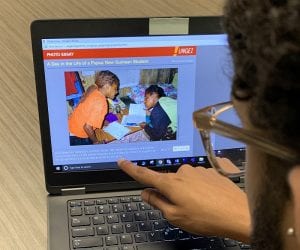“Women hold up half the sky,” reads an old Chinese saying. Indeed, women have traditionally been the world’s farmers, child bearers, and caretakers – the backbone of families and societies. And yet, women continue to suffer from gender discrimination in much of the world. This second-class citizenship is detrimental first and foremost to the well-being of women themselves, and is also a major obstacle to advancing economic development, reducing poverty and achieving environmentally sustainable societies.

Access to Education
There are too many families around the world who cannot afford the school fees or books needed to educate their children, and when such funds can be accessed, they are often put towards educating sons rather than daughters. Globally, girls are 1.5 times more likely than boys to be excluded from primary school, and roughly two-thirds of the 781 million illiterate adults are women. Educated women are typically healthier, higher earners, marry later and have fewer children.
Gender Equality
Many societies prevent women from full participation in public, political, and economic life, confining them to more domestic roles. These norms and prejudices can prevent women’s equal access to education, property rights, credit, job training and employment. Women who are employed experience glaring economic discrimination, globally earning on average 24% less than men. When women are income earners and financially independent, they are more likely than men to put that money back into their family – paying for better nutrition, medicine and improved housing.
Women in Government
Many legal and social institutions, like nations’ constitutions and political parties, fail to guarantee women’s equality in political participation. Women are underrepresented at many levels – worldwide only 22 percent of legislators are women and only 19 women are serving as Heads of State (out of 195 countries). Women in political leadership positions more often champion issues involving women’s rights and health, as well as other issues that would otherwise be overlooked.
Child Marriage
Gender inequality, poverty, cultures and traditions, and lack of education all drive child marriage, a practice that severely impacts the health, education, and independence of women around the world. Girls who become brides often drop out of school and miss educational opportunities, which in turn limits their employment opportunities and financial security. Younger brides have more children in their lifetime on average, driving fertility rates up and contributing to population growth, particularly in developing nations. Many nations lack laws and policies that can prevent child marriage and support girls who are married.
Women’s Health
In societies where daughters are valued less than sons, girls’s health often receives less care, attention, and treatment than the boys in the family. These problems are exacerbated if they live in rural and remote areas with poor infrastructure. As adults, women living in poverty are exposed to greater health risks and often do not have the means to pay for healthcare and adequate nutrition. Women’s access to information and services to protect their reproductive health – including control over the number and timing of children – are especially important. Complications involving pregnancy and childbirth are the second biggest killer of women of reproductive age, chiefly because many women in developing countries lack access to family planning and basic healthcare services. When women can choose the number and timing of births they tend to have fewer children, leading to better health outcomes for mother and child and giving women more freedom to fully participate in society.
These disparities must be addressed for the autonomy and well-being of women, as well as for the social and economic development of global society because advancing women and girls around the world benefits everyone. It benefits the individuals themselves, it benefits families, it benefits communities, and it even benefits entire countries.
Advancing women and girls is one of the topics for the 2017-2018 World of 7 Billion student video contest. For more information on population and the advancement of women and girls, check out the contest background resources.
Image credits: Young students with globe (©Petro, Dreamstime.com)



